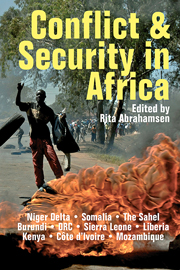Book contents
- Frontmatter
- Contents
- Preface
- Notes on Contributors
- Permissions
- 1 Introduction: Conflict & Security in Africa
- Section One Global Economies, State Collapse & Conflicts
- 2 Ironies of Post-Cold War Structural Adjustment in Sierra Leone
- 3 Timber Booms, State Busts: The Political Economy of Liberian Timber
- 4 Petro-Insurgency or Criminal Syndicate? Conflict & Violence in the Niger Delta
- 5 Oil as the ‘Curse’ of Conflict in Africa: Peering through the Smoke & Mirrors
- 6 Defence Expenditures, Arms Procurement & Corruption in Sub-Saharan Africa
- Section Two Global Security Governance
- Section Three Cultures of Conflict & Insecurity
- Index
6 - Defence Expenditures, Arms Procurement & Corruption in Sub-Saharan Africa
from Section One - Global Economies, State Collapse & Conflicts
Published online by Cambridge University Press: 05 October 2013
- Frontmatter
- Contents
- Preface
- Notes on Contributors
- Permissions
- 1 Introduction: Conflict & Security in Africa
- Section One Global Economies, State Collapse & Conflicts
- 2 Ironies of Post-Cold War Structural Adjustment in Sierra Leone
- 3 Timber Booms, State Busts: The Political Economy of Liberian Timber
- 4 Petro-Insurgency or Criminal Syndicate? Conflict & Violence in the Niger Delta
- 5 Oil as the ‘Curse’ of Conflict in Africa: Peering through the Smoke & Mirrors
- 6 Defence Expenditures, Arms Procurement & Corruption in Sub-Saharan Africa
- Section Two Global Security Governance
- Section Three Cultures of Conflict & Insecurity
- Index
Summary
Within neoliberal discourse, corruption, understood as the ‘misuse of public power for private or political gain’, has been identified as a major obstacle to development in that it reduces domestic investment, discourages foreign direct investment (FDI), inflates government expenditures and distorts public spending by shifting resources from education, health and infrastructural investment into sectors more malleable to corruption, such as the security sector.
In its 2006 Development White Paper, the UK Department for International Development committed itself to scrutinising public spending and procurement in the defence sector in developing countries as part of its broader anti-corruption campaign and as an extension of its work on security sector reform. The goal was to improve transparency and accountability in military budgeting and arms procurement in developing countries. In November 2007, DFID tentatively launched its Transparency in Defence Expenditures (TIDE) initiative. The stimulus for this initiative was inspired by a paper produced by the IMF economists Gupta et al. (2000), who hypothesised that corruption is highly correlated with (1) high shares of military expenditure in both GDP and overall government expenditure; and (2) high levels of military procurement spending in relation to both GDP and total government spending. Without evaluating the suitability of their methodology to the context of sub-Saharan Africa (SSA), DFID officials commissioned a series of consultancy papers from defence economic ‘experts’ to explore the extent of corruption in military expenditures and arms procurement in sub-Saharan Africa, using the quantitative methodologies favoured by Gupta et al.
- Type
- Chapter
- Information
- Conflict and Security in Africa , pp. 79 - 96Publisher: Boydell & BrewerPrint publication year: 2013



